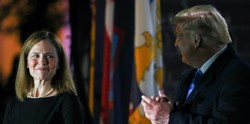An article on The Washington Post recently published a map of “Who Loves and Hates America: A revealing map of global opinion toward the U.S.,” which broke down various countries approval rating of America.
Dr. Saliba Sarsar, professor of political science and Associate Vice President for Global Initiatives, said, “There are those who are happy to live in their own countries and who do not wish to immigrate. There are also those who are unhappy in their own countries, who wish to immigrate, but cannot for various reasons.”
Sarsar continued, “Still, there are those who feel disaffected and have a negative view of U.S. policies abroad, while they have positive views of the American people. In particular are policies that they interpret or misinterpret as biased, expansionistic, or self-serving. For instance, more than a few Middle Easterners are suspicious of U.S. policies towards authoritarian regimes, as well as U.S. actual or perceived conflict with Muslim-majority countries.”
The Washington Post article continues to discribe the countries that do have a sense of approval for the U.S. “So who seems to like America? It’s a long list – longer than you might expect. America scores similar favorability ratings in a few countries we might assume, wrongly, don’t like us so much: Mexico, despite U.S. immigration policies targeting Mexicans, and Russia, where President Vladimir Putin has pushed some populist anti-Americanism. We are also moderately liked in the post-Soviet state of Ukraine, in Brazil and in the United Kingdom. I thought we’d be more popular in the U.K., where politicians make a big deal out of the special relationship with Washington.”
Dr. Kenneth Mitchell, associate professor of political science, said, “Latin Americans separate their thoughts about the USA government and the American people. Few blame Americans in general for actions by the USA government that Latin Americans’ disagree with. Americans can walk the streets of Caracas, La Paz, Quito and Buenos Aires, capitals of countries with strongly anti-USA governments, without any worries beyond the typical megacity crime issues. Latin Americans’ in general disagree with most USA foreign policy goals in the area of security and financial globalization.”
Mitchell continued, “Latin Americans are often reflexively religious and more or less pro-capitalism, explaining the limited appeal of communism in the region. This offers a general set of values that parallel those in the USA. Latin Americans have no ambition to challenge militarily the USA, so we do not see the Great Power dynamics currently observed between the USA and Russia or China.”
Dr. Charles Cotton, an adjunct professor of political science, explains that to a certain extended the actions and thoughts of the U.S could be seen as “aggressive.” However this is not everywhere, since it is believe that the views can differ.
Cotton said, “There are people that are going to support the stands of America. Focusing on Europe, it is an interesting place because for the most part the United States and Europe are allies. They have a really strong relationship doing back to WWII. And even more recently with the war in Iraq, which was highly support by the United Kingdom and Spain. Because our impact is so great, it does become more and more polorizing.”
One thing that can be noticed is that whoever is in power in the U.S can influence how a country perceives the nation. When George W. Bush was re-elected into office in 2004, 18 of 21 countries polled reacted negatively the news, according to the Program on International Policy Attitudes. On average around all countries, 58 percent said that Bush’s re-election was negative, while 26 percent said that it was positive for global security.
The most negative countries are western European, Latin American and the Middle East. The poll also finds that for a substantial minority worldwide these negative feelings about Bush have generalized to the American people. Asked how Bush’s election has affected their feelings toward the American people, on average, 42 percent said it made them feel worse toward the American people, while 25 percent said it made them feel better and 23 percent said it had no effect.
Crystal Diaz, a freshman biology major from the Dominican Republic said, “When I visit Dominican Republic, the people believe that Americans have everything and more. They assume that we do not work for what we have, and that everything comes easy for us. If they came to America and saw that we all have to work for what we have, their views would change extremely.”
Sarsar further explains the misconception of Americans and their lives in the U.S. “It goes without saying that there is a great deal of misconception and misunderstanding, and the U.S. can help counteract it by: 1. Communicating its intentions and policies accurately and clearly. 2. Anchoring its strategies in basic American values of equity and transparency, in addition to its common interests with various world regions; and 3. Promoting pluralism, good governance, human development, and sound economic practices that are aimed at enhancing quality of life and opportunities.”
Kegan Ellis, a freshman physical education major from Trindad said, “Being here is different from being in Trinidad, obviously. But it is not what I expected it to be. However, my choice was definetly for the best.”
Sarsar continued “Ultimately, what the world needs is awareness, understanding, and cooperation in support of empowerment, respect, prosperity, and peace. The U.S. can play a pivotal role as it shakes hands with or embraces the world and as it welcomes citizens of various countries.”
Sarsar concluded, “In A Nation of Immigrants, John F. Kennedy stated, ‘The interaction of desperate cultures, the vehemence of the ideals that led the immigrants here, the opportunity offered by a new life, all gave America a flavor and a character that make it as unmistakable and as remarkable to people today as it was to Alexis de Tocqueville in the early part of the nineteenth century.’”


